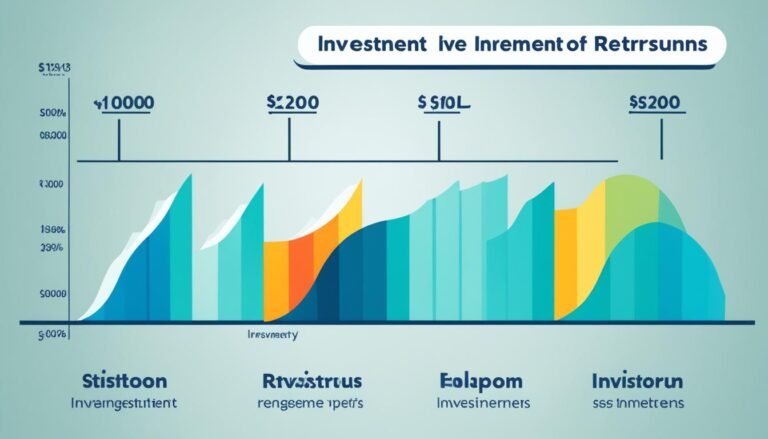InsurTech: Innovations Transforming the Insurance Industry
Did you know that InsurTech startups have attracted over $30 billion in funding since 2010?
InsurTech, the convergence of insurance and technology, is disrupting the insurance industry and driving digital transformation. From AI-powered predictive analytics to blockchain-based secure platforms, InsurTech companies are revolutionizing the way insurance is bought, sold, and managed.
In this article, we will explore the evolution of InsurTech, the role of blockchain and artificial intelligence in insurance, and how telematics and IoT are revolutionizing auto insurance. We will also discuss the impact of InsurTech startups on the industry and the importance of simplifying the customer experience through digital platforms and ecosystems. Lastly, we will delve into the growing demand for cyber insurance as businesses face increasing cybersecurity risks.
Join us on this journey as we explore the dynamic world of InsurTech and uncover the innovations that are transforming the insurance industry.
Key Takeaways:
- InsurTech startups have attracted over $30 billion in funding since 2010.
- InsurTech combines insurance and technology to drive digital transformation in the insurance industry.
- Blockchains are being leveraged to streamline processes, enhance transparency, and prevent fraud in insurance.
- Artificial intelligence and machine learning enable data-driven decision making, personalized insurance offerings, and efficient underwriting processes.
- Telematics and IoT devices revolutionize auto insurance by providing real-time driver behavior data and personalized pricing.
The Evolution of InsurTech: Past, Present, and Future
The evolution of InsurTech has been driven by advancements in technology and the need for more efficient and customer-centric insurance solutions. Over the years, the insurance industry has witnessed significant technological advancements, from the use of mainframe computers to the emergence of smartphones and cloud storage. These technological leaps have transformed the industry, leading to the development of new products, distribution methods, and risk evaluation techniques.
“Technology advancements in insurance have shaped the industry, making it more agile, data-driven, and responsive to customer needs.”
As we enter the Fourth Industrial Revolution, InsurTech stands at the forefront of innovation. The InsurTech ecosystem emphasizes collaboration between startups and legacy providers to deliver value not only to insurers but also to customers. The integration of InsurTech solutions has revolutionized the insurance industry by creating more efficient processes, personalized customer experiences, and improved risk management.
The future of InsurTech holds immense potential for further transformation. Ongoing developments in emerging technologies are set to revolutionize the insurance landscape. These include:
- Blockchain: The use of blockchain technology in insurance promises secure and transparent transactions, fraud prevention, and enhanced trust between insurers and policyholders.
- Artificial Intelligence (AI) and Machine Learning (ML): The adoption of AI and ML algorithms allows insurers to analyze large volumes of data quickly and accurately, leading to better risk assessment, personalized insurance products, and automated underwriting processes.
- Telematics and Internet of Things (IoT): The integration of telematics and IoT devices enables insurers to collect real-time data on driver behavior, resulting in personalized pricing, safer driving habits, and more accurate risk evaluation in auto insurance.
“The ongoing advancements in blockchain, AI, telematics, and IoT are poised to revolutionize the insurance industry and redefine the way insurers operate and serve their customers.”
As the industry moves forward, the evolution and integration of technology will continue to shape the future of InsurTech, benefiting both insurers and policyholders alike.
The Evolution of InsurTech
| Era | Technological Advancements | Impact on InsurTech |
|---|---|---|
| Pre-digital era | Manual processes and paperwork | Traditional insurance business model |
| Computer era | Mainframe computers and databases | Automation of underwriting and policy management |
| Internet era | Online connectivity and e-commerce | Emergence of online insurance platforms |
| Mobile era | Smartphones and mobile apps | Mobile-centric insurance services and customer engagement |
| Cloud era | Cloud storage and data analytics | Data-driven decision making and personalized insurance products |
| Fourth Industrial Revolution | Blockchain, AI, telematics, IoT | Collaboration, efficiency, personalized experiences, and enhanced risk management |
The Role of Blockchain in InsurTech
Blockchain technology is revolutionizing the insurance industry, providing secure and transparent platforms for transactions. Insurers are leveraging blockchain to streamline processes such as policy issuance, claims management, and fraud prevention, thereby enhancing operational efficiency and improving customer satisfaction.
One of the key advantages of blockchain technology in insurance is its ability to ensure secure transactions. By using cryptographic algorithms and decentralized networks, blockchain minimizes the risk of unauthorized access or tampering with sensitive data. This level of security instills trust between insurers and policyholders, protecting their information and reducing the potential for fraudulent activities.
In addition to security, blockchain technology enables transparency in the insurance industry. Every transaction recorded on the blockchain is transparent and immutable, creating a reliable trail of information. Policyholders can have complete visibility into their policies, claims, and payments, promoting greater accountability and reducing disputes between parties.
The utilization of blockchain also contributes to fraud prevention in the insurance sector. The transparency and traceability provided by this technology significantly reduce the potential for fraudulent claims. Insurers can easily verify the authenticity of claims and detect suspicious patterns of behavior, leading to better fraud detection and prevention mechanisms.
To illustrate the benefits of blockchain in insurance, consider the following table:
| Advantages of Blockchain in InsurTech | Description |
|---|---|
| Secure Transactions | Blockchain ensures the security and integrity of transactions, minimizing the risk of fraud and unauthorized access. |
| Transparency in Insurance | Blockchain facilitates a transparent and immutable record of transactions, promoting accountability and reducing disputes. |
| Fraud Prevention | By enabling greater traceability and verification, blockchain technology helps prevent fraudulent activities in the insurance industry. |
As the insurance industry continues to embrace digital transformation, the adoption of blockchain technology is expected to increase. Insurers recognize the numerous benefits it offers, including secure transactions, transparency, and fraud prevention. By leveraging blockchain, insurers can enhance customer experiences, improve operational efficiency, and establish themselves as forward-thinking leaders in the industry.
The Power of Artificial Intelligence and Machine Learning in Insurance
Artificial intelligence (AI) and machine learning (ML) are revolutionizing the insurance industry by enabling data-driven decision making. Insurers are leveraging AI and ML algorithms to analyze large amounts of data quickly and accurately, empowering them to assess risk more effectively, personalize insurance products, and automate underwriting processes.
With AI and ML, insurers can now make data-driven decisions based on advanced predictive modeling and algorithms. By analyzing vast volumes of historical data, AI can identify patterns and trends that humans may overlook, enabling insurers to make more accurate risk assessments and predictions.
Underwriting automation is a key area where AI and ML are creating efficiencies in the insurance industry. Traditionally, underwriting involved manual processes that required considerable time and resources. However, with the power of AI, insurers can automate underwriting tasks and streamline the entire process, reducing costs and improving efficiency.
Another significant impact of AI and ML in insurance is in customer interactions. AI-powered chatbots are being utilized to enhance customer experience and provide real-time assistance. These chatbots can answer policy-related questions, handle claims inquiries, and provide personalized recommendations, leading to higher customer satisfaction and improved overall customer interactions.
“AI and ML algorithms enable insurers to assess risk more effectively, personalize insurance products, and automate underwriting processes.”
By leveraging AI and ML, insurance companies can also enhance fraud detection and prevention. The advanced algorithms can quickly identify anomalies in data patterns, enabling insurers to detect and prevent fraudulent activities, ultimately protecting both the company and its customers.
The adoption of AI and ML in the insurance industry is critical for staying competitive in the digital age. Insurers that embrace these technologies can streamline operations, improve decision-making processes, and provide more tailored and efficient solutions to their customers.
Telematics and IoT: Revolutionizing Auto Insurance
The integration of telematics and Internet of Things (IoT) devices is transforming the auto insurance industry. By leveraging telematics and IoT, insurers can collect real-time data on driver behavior, leading to personalized pricing based on individual risk profiles. This allows safe drivers to enjoy lower premiums while incentivizing safer driving habits, ultimately resulting in a reduction in accidents and insurance claims.
Telematics and IoT devices provide insurers with valuable driver behavior data, enabling them to assess risk more accurately. With this data, insurers can design insurance products that align with the specific needs of customers, further enhancing the value and customization of their offerings.
By leveraging the power of telematics and IoT, auto insurers are reshaping the insurance landscape and fostering safer driving habits among policyholders. This not only benefits individual drivers but also contributes to the overall improvement of road safety and the reduction of insurance risks.
With telematics and IoT, the future of auto insurance is becoming increasingly connected and data-driven, empowering insurers to deliver personalized solutions that cater to the unique needs of each policyholder. This technological advancement holds immense potential in revolutionizing the way auto insurance is priced and managed, paving the way for a safer and more customer-centric industry.
The Impact of InsurTech Startups on the Insurance Industry
InsurTech startups are revolutionizing the insurance industry with their fresh ideas and innovative solutions. These startups are continuously developing tailored products and services that cater to the evolving needs of customers. By integrating digital platforms and adopting agile methodologies, InsurTech startups are pushing traditional insurers to adapt and evolve in order to stay competitive. This competition between startups and legacy providers is driving overall industry innovation and accelerating the adoption of technological advancements.
The collaboration between InsurTech startups and legacy providers has led to the development of digital ecosystems that simplify the customer experience and make insurance more accessible and transparent. These startups are leveraging digital platforms to create seamless and user-friendly insurance processes. Through their disruptive approach, InsurTech startups are reshaping the insurance industry and challenging long-standing conventions.
“The collaboration between InsurTech startups and legacy providers has led to the development of digital ecosystems that simplify the customer experience and make insurance more accessible and transparent.”
InsurTech startups differentiate themselves by identifying and targeting specific niches within the insurance market. This targeted approach allows them to deliver tailored products and services that meet the unique requirements of their customers. By focusing on niche segments, InsurTech startups are able to provide a level of customization and personalization that goes beyond what traditional insurers offer.
Through their digital platforms, InsurTech startups are transforming the way insurance is delivered and experienced by customers. These platforms provide a seamless and intuitive user interface, allowing customers to easily manage their policies, file claims, and access support. By embracing technology and innovation, InsurTech startups are making insurance more user-friendly and customer-centric.
To illustrate the impact of InsurTech startups on the insurance industry, consider the following table:
| Insurance Industry Impact | Traditional Insurers | InsurTech Startups |
|---|---|---|
| Innovation | Slow to adopt new technologies and adapt to changing customer expectations. | Driving innovation through disruptive ideas and technological advancements. |
| Customer-Centricity | Offering standardized products and services with limited personalization. | Delivering tailored solutions that cater to specific customer needs and preferences. |
| Digital Transformation | Struggling to embrace digital platforms and transition to digital ecosystems. | Utilizing digital platforms to provide seamless user experiences and simplify insurance processes. |
| Disruption | Operating within traditional business models with limited disruption. | Challenging traditional business models and driving industry-wide disruption. |
As seen in the table, InsurTech startups are challenging traditional insurers by driving innovation, offering tailored products and services, embracing digital transformation, and disrupting the industry.
Key Takeaways:
- InsurTech startups are revolutionizing the insurance industry with their fresh ideas and innovative solutions.
- These startups focus on specific niches, providing tailored products and services that meet the evolving needs of customers.
- By embracing digital platforms, InsurTech startups are challenging traditional insurers to adapt and evolve.
- The collaboration between startups and legacy providers is resulting in the development of digital ecosystems that simplify the customer experience and make insurance more accessible.
- The impact of InsurTech startups is evident in their ability to drive innovation, deliver tailored solutions, embrace digital transformation, and disrupt traditional business models.
Simplifying Customer Experience with Digital Platforms and Ecosystems
Digital platforms are revolutionizing the way customers interact with insurance providers, providing a seamless and user-friendly customer experience. InsurTech innovations such as mobile apps and online policy management tools make insurance more accessible and transparent, allowing customers to easily manage their policies and make claims.
With the help of digital platforms, insurers can provide convenient access to policy information, update coverage details, and handle claims efficiently. Online policy management tools empower customers to have control over their insurance policies, enabling them to make changes, track progress, and access relevant documents anytime, anywhere.
Seamless claims processing systems further enhance the customer experience by simplifying the claims submission and settlement process. With digital platforms, customers can file claims electronically, submit supporting documents easily, and receive timely updates on the progress of their claims.
By embracing digital ecosystems, insurers can create a cohesive and integrated customer journey. This allows for a consistent experience across multiple touchpoints, ensuring that customers can seamlessly switch between channels without any disruption. From browsing policies on a website to contacting a customer service representative via chatbot or phone, digital platforms enable insurers to cater to the preferences and convenience of their tech-savvy customers.
The importance of customer experience in the digital era cannot be overstated. Customers today value convenience, efficiency, and transparency in their interactions with insurers. Insurers that prioritize digital platforms and ecosystems are better positioned to attract and retain customers who seek simplified and personalized experiences.
Benefits of Digital Platforms and Ecosystems for Customers
- Convenient access to policy information
- Easy policy management and updates
- Seamless claims filing and settlement
- Timely updates and notifications
- Consistent experience across channels
Digital platforms and ecosystems not only benefit customers but also provide significant advantages for insurers. By embracing technology and offering enhanced customer experiences, insurers can gain a competitive edge in the market and build long-lasting relationships with their policyholders.
Addressing Evolving Risks with Cyber Insurance
As businesses and individuals face increasing cyber threats, the demand for cyber insurance has surged. InsurTech is at the forefront of developing comprehensive cyber insurance solutions that help companies mitigate the risks associated with data breaches, ransomware attacks, and other cyber threats. The cyber insurance sector is evolving rapidly to keep pace with the ever-changing cybersecurity landscape. Insurers are leveraging technology and data analytics to assess cyber risks accurately and design insurance products that provide coverage for emerging threats.
Conclusion
The InsurTech revolution is reshaping the insurance industry, driving efficiency, customer-centricity, and adaptability. The convergence of technology and insurance is not just a trend but a fundamental shift that is transforming traditional business models. By embracing technological advancements, insurers can thrive in the digital age while offering enhanced services and value to customers, all while navigating the evolving landscape of risks.
The future of InsurTech is promising, with ongoing advancements in blockchain, artificial intelligence, telematics, and the Internet of Things (IoT) expected to further revolutionize the insurance industry. These transformative technologies are enabling insurers to streamline processes, make data-driven decisions, and create personalized products and services. InsurTech is driving the industry toward a more customer-centric approach, with digital platforms simplifying interactions and providing seamless experiences for policy management and claims processing.
As the InsurTech revolution continues, it will be fascinating to witness how the insurance industry evolves and adapts to these transformative changes. Insurers who embrace the InsurTech revolution will unlock new opportunities for growth, enhance operational efficiency, and stay ahead of the competition. The key to success in this rapidly evolving landscape is to remain agile, open to innovation, and committed to providing value to customers in an increasingly digital world.
FAQ
What is InsurTech?
InsurTech refers to the use of technology and innovation to transform the insurance industry. It involves the implementation of digital solutions and disruptive technologies to drive efficiency, customer-centricity, and adaptability.
How is InsurTech revolutionizing the insurance industry?
InsurTech is revolutionizing the insurance industry by combining technology and innovation. It is driving faster, cheaper, and better results, and reshaping traditional business models. InsurTech startups are introducing fresh ideas and innovative solutions that challenge incumbents and drive overall industry innovation.
What are some examples of InsurTech solutions?
InsurTech companies offer a wide range of solutions, such as core systems, artificial intelligence (AI)-based predictive analytics, risk assessment tools, distribution platforms, and more. These solutions aim to enhance various aspects of the insurance value chain, from improving underwriting processes to simplifying customer experience.
How has technology evolved in the insurance industry?
The insurance industry has seen significant technological advancements over the years, from the use of mainframe computers to the emergence of smartphones and cloud storage. Each technological leap has transformed the industry, leading to new products, distribution methods, and risk evaluation techniques.
What is the future of InsurTech?
The future of InsurTech is promising, with ongoing developments in blockchain, artificial intelligence, telematics, and the Internet of Things (IoT) expected to revolutionize the insurance industry even further. These advancements will drive efficiency, customer-centricity, and adaptability, and will continue to reshape traditional business models.
How is blockchain transforming the insurance industry?
Blockchain technology is transforming the insurance industry by providing secure and transparent platforms for transactions. Insurers are leveraging blockchain to streamline processes such as policy issuance, claims management, and fraud prevention. This technology ensures data integrity and reduces the risk of fraud, enhancing trust between insurers and policyholders.
What role does artificial intelligence (AI) play in insurance?
Artificial intelligence (AI) is transforming the insurance industry by enabling data-driven decision making. Insurers are using AI and machine learning (ML) algorithms to analyze large amounts of data quickly and accurately, allowing them to assess risk more effectively, personalize insurance products, and automate underwriting processes. AI-powered chatbots are also improving customer interactions by providing real-time assistance and enhancing customer satisfaction.
How are telematics and IoT impacting the auto insurance sector?
Telematics and the Internet of Things (IoT) are revolutionizing the auto insurance sector. Insurers can now collect real-time data on driver behavior through telematics devices, allowing for personalized pricing based on individual risk profiles. This benefits safe drivers with lower premiums and encourages safer driving habits, ultimately reducing the number of accidents and claims. Telematics and IoT devices also provide valuable data that enables insurers to assess risk more accurately and design insurance products that meet the specific needs of customers.
How are InsurTech startups disrupting the insurance industry?
InsurTech startups are disrupting the insurance industry by introducing fresh ideas and innovative solutions. They often focus on specific niches, providing tailored products and services that meet the evolving needs of customers. By embracing digital platforms and agile methodologies, these startups are challenging traditional insurers to adapt and evolve. The competition between InsurTech startups and legacy providers is driving overall industry innovation and pushing insurers to embrace technological advancements.
How are digital platforms simplifying the customer experience in insurance?
Digital platforms are transforming the way customers interact with insurance providers, simplifying the customer experience. InsurTech innovations include user-friendly mobile apps, online policy management tools, and seamless claims processing systems. These digital platforms make insurance more accessible and transparent, allowing customers to easily manage their policies and make claims. Insurers that embrace digital ecosystems are better positioned to attract and retain tech-savvy customers who value convenience and efficiency in their interactions with insurers.
What is cyber insurance and how is InsurTech addressing it?
Cyber insurance provides coverage for risks associated with data breaches, ransomware attacks, and other cyber threats. InsurTech is at the forefront of developing comprehensive cyber insurance solutions that help companies mitigate these risks. Insurers leverage technology and data analytics to assess cyber risks accurately and design insurance products that provide coverage for emerging threats. As the cybersecurity landscape evolves, InsurTech continues to innovate and develop solutions to address new challenges.
How is the InsurTech revolution reshaping the insurance industry?
The InsurTech revolution is reshaping the insurance industry by driving efficiency, customer-centricity, and adaptability. The convergence of technology and insurance is not just a trend but a fundamental shift that is transforming traditional business models. Insurers who embrace technological advancements are well-positioned to thrive in the digital age, offering enhanced services and value to customers while navigating the evolving landscape of risks.








